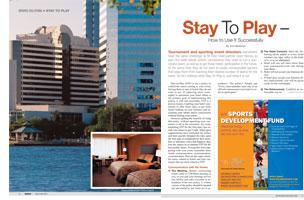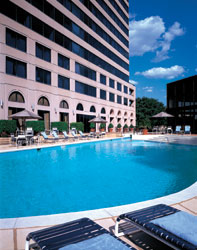
 Tournament and sporting event directors everywhere have the same challenge: to fill their hotel-partner room blocks, to earn the hotel rebate and/or concessions they need to run a successful event, as well as to get those hotels' participation in the future. At the same time, they do not want to create unreasonable barriers that keep them from reaching their desired number of teams for the event. So let's address what Stay-To-Play is, and what it is not.
Tournament and sporting event directors everywhere have the same challenge: to fill their hotel-partner room blocks, to earn the hotel rebate and/or concessions they need to run a successful event, as well as to get those hotels' participation in the future. At the same time, they do not want to create unreasonable barriers that keep them from reaching their desired number of teams for the event. So let's address what Stay-To-Play is, and what it is not.
Stay-to-Play (STP) is not a policy to control the teams coming to your event, forcing them to stay in hotels they do not want to use. If capturing more room nights to maximize your hotel rebate is the primary goal of implementing this policy, it will fail miserably. STP is a proven means of getting your hotel community to offer lower rates, to get more hotels bidding on your business and increasing your rebate and/or concessions without hurting your teams.
However, getting the benefits of using this policy without upsetting your customers is all in the execution. An event, instituting STP for the first time, has exactly one chance to get it right. Many sport organizations have instituted the policy and then quickly dropped the idea upon the first sign of complaints by their members or attendees. Once that happens, they lose the chance to re-institute STP for the foreseeable future. To keep this from happening with your event, remember three words: communication, communication, communication. Here are the major checklist items, related to hotels and your customers that are most critical to STP:
Communication with the Hotels
1) The Meeting. Before contracting rooms, hold a CVB/Hotel meeting so you, or you and your housing service can inform (not ask) everyone in attendance of the new policy. A written version of the policy should be handed out and mailed to any hotel not in attendance. The policy? Simply put "Every team/attendee must stay in an official tournament/event hotel in order to participate."
 2) The Hotel Contract. Have the following terms added to every hotel contract you sign, either in the body of it, or as an addendum:
2) The Hotel Contract. Have the following terms added to every hotel contract you sign, either in the body of it, or as an addendum:
a. Hotel will not sell rates lower than your tournament/event rate during your dates;
b. Hotel will not accept your business direct;
c. If hotel does accept your business direct inadvertently, you will be given credit for the room nights.
3) The Enforcement. Establish an enforceable way to crosscheck which teams have registered vs. which have complied with the policy. Communicate this to the hotels.
4) The Hotel Choices. Block/contract an adequate number of hotels at varying rates and amenities. Having hotels that satisfy every team's budget level and quality desire is an important piece in the communication of the policy to your customers.
Communication with the Teams
1) The Policy. Establish it in writing and communicate it on a timely basis, before the teams have made hotel reservations. The policy should include these issues:
a. Establishing the minimum number of rooms you require each team to book;
b. Determining how to deal with teams that cancel their hotel reservation after you accept them;
c. Giving a waiver to teams that live close enough to drive back and forth from home and don't need to stay in a hotel (and have a way to verify this);
d. Deciding how to motivate/capture parent rooms in the event you set your minimum number of room per team so low it creates a loophole.
 2) Push-Back. Instituting STP will benefit your tournament and the great majority of the teams. However, understand that 10% of your attendees will complain and try to get around the policy. If you do not have the support of this from the top of your organization and are not prepared for the push-back, then don't do it.
2) Push-Back. Instituting STP will benefit your tournament and the great majority of the teams. However, understand that 10% of your attendees will complain and try to get around the policy. If you do not have the support of this from the top of your organization and are not prepared for the push-back, then don't do it.
3) Hotel Options. Allow teams that do not find a hotel that they like on your list, to ask for a particular hotel or hotel type be added to your 'official' list. This is the part of the policy that will eliminate many of the complaints from the teams. However, it must be executed correctly in order to work to everyone's benefit. Here's how:
a. When a team asks for a particular hotel/hotel type, tell them that you will make every effort to add it, but don't guarantee it. The fact is, the hotel may be sold out by the time you call, or may not be willing to offer the rate and terms you need to make it work.
b. If a team asks for a particular hotel, they likely were quoted a rate, one without rebate or concessions. Bad P.R. Alert: If you add that hotel and let them increase that quoted rate to include your rebate and/or concessions, you will have fulfilled everyone's worst nightmare about the horrors of STP. Your goal is to motivate the hotel to honor the quoted rate with your rebate and/or concessions, either with the fact that it is the only way the hotel will get that team's business, and/or by offering to take a larger block of rooms so other teams can stay there.
c. You will have a high success rate, adding hotels at the rate and terms you need, but in the cases where you can't, do not accept a higher rate even if the team says it's ok. Even if they agree to the higher rate, it won't stop them from (correctly) stating to other teams that the STP cost them money.
4) Rate Integrity. Teams often try to go around event hotel blocks because they either can, or think they can, find lower rates on their own. Though you will cover the "no lower rate" issue in your hotel contracts, this does not guarantee the hotel will deliver as promised. Some hotels offer lower rates maliciously. Much more common, though, is that the hotel contact, making the promise of "lowest rates" is not the person at the hotel that manages it. Also, things change - the hotel may have lost a large piece of business since your contracting date and forgetting about the terms in your contract, offers low rates to try to recover from that cancellation. Whatever the case, your event will only have the lowest rates as promised if you monitor it by making biweekly phone calls to each hotel's front desk and checking their website, to make sure they are complying. If you find a problem, call your sales contact, and in most cases they appreciate the heads-up and will rectify the problem. If they won't, cancel the block.
The Secret of STP This may be a surprise, but the vast majority of hotels do not hate STP, in fact most of the hotels you work with, as well as your CVB, love it. Why? Because many of your hotel partners are offering you heavily discounted rates and likely extra concessions to both get your business and to support your organization. STP gives them a better chance of filling their blocks and in the hotel world, more room nights from your event helps to offset the discounted rates they give you.
This may be a surprise, but the vast majority of hotels do not hate STP, in fact most of the hotels you work with, as well as your CVB, love it. Why? Because many of your hotel partners are offering you heavily discounted rates and likely extra concessions to both get your business and to support your organization. STP gives them a better chance of filling their blocks and in the hotel world, more room nights from your event helps to offset the discounted rates they give you.
So, what's the secret of STP? It's not to control the teams or your partner hotels. It's an effective way to get cooperation from the hotels in your community that won't work with you. Yes, the hotels located close to your venue(s) will fill regardless, concluding they can make more money by taking your teams direct at a higher rate, while you earn nothing. The bottom-line is that instituting the STP and executing it well should have the effect of lowering your average hotel rates 10-15% (more with your overflow hotels), while maximizing your revenue and concessions without hurting your customers. Do it correctly and everyone wins!

